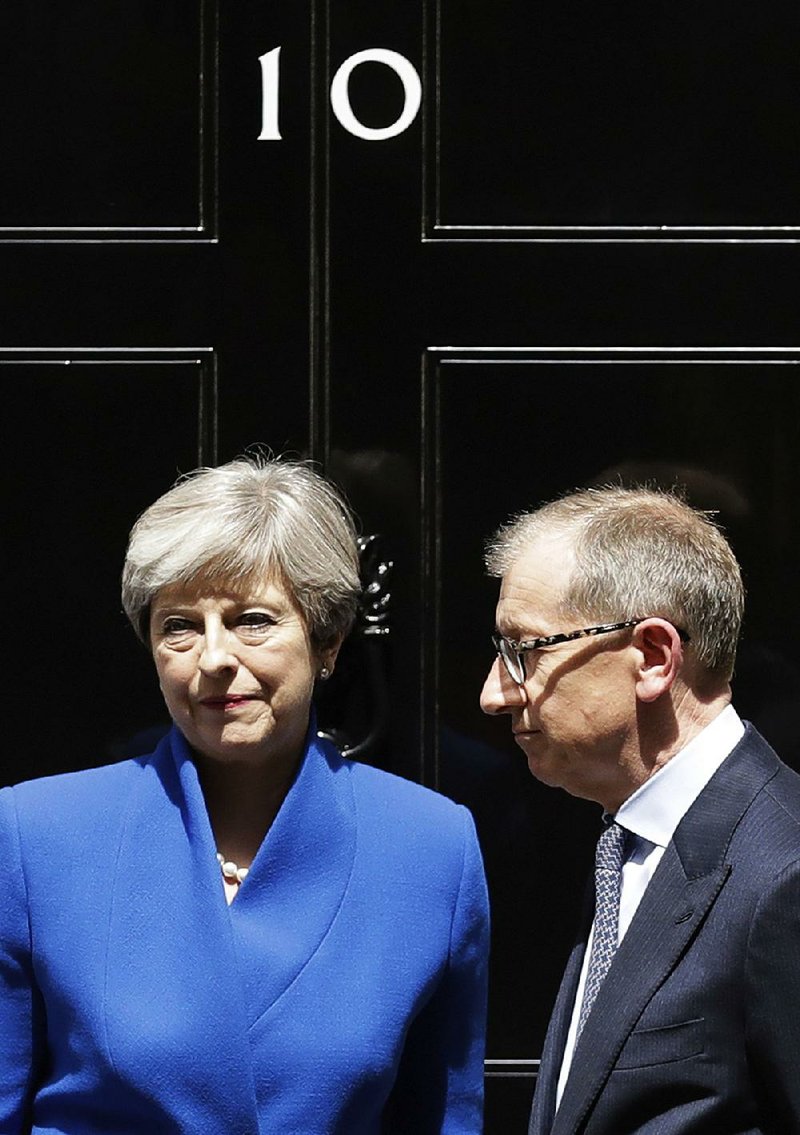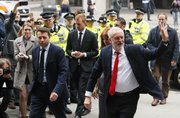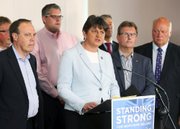LONDON -- British Prime Minister Theresa May tried Friday to carry on with the business of governing as usual, while her Conservative Party reeled from losing its parliamentary majority and her opponents demanded that she resign.
An election that May called to strengthen her hand as the United Kingdom leaves the European Union ended with the exit path more muddied than ever.
Meanwhile, opposition Labor Party leader Jeremy Corbyn savored a surprisingly strong result boosted by an energized, youthful base.
British newspapers summed it up in a word: mayhem.
But May soldiered on Friday, reappointing senior ministers to her Cabinet and holding talks with a small Northern Irish party about shoring up her minority government.
"I obviously wanted a different result last night," May acknowledged, promising she would "reflect on what happened."
She asserted that would stay on as prime minister and that her plans for an EU exit would go forward.
"That's what people voted for last June," she said. "That's what we'll deliver. Now let's get to work."
With results in from all 650 House of Commons seats after Thursday's vote, May's Conservatives had 318 -- short of the 326 they needed for an outright majority and well down from the 330 seats they had before May's roll of the electoral dice.
Labor had 262, up from 229, and the Scottish National Party 35, a loss of about 20 seats that complicates the party's plans to push for Scotland's independence.
The final result was announced almost 24 hours after polls closed. After three recounts, Labor took the wealthy London constituency of Kensington from the Conservatives by just 20 votes.
Speaking outside No. 10 Downing St., May scarcely acknowledged the election's outcome, promising to form "a government that can provide certainty."
She said the government would start exit negotiations with the EU as scheduled in 10 days.
"This government will guide the country through the crucial Brexit talks ... and deliver on the will of the British people by taking the United Kingdom out of the European Union," she said after visiting Buckingham Palace to inform Queen Elizabeth II that she would try to form a new government.
This is the first time since the 1990s that Britain has a minority government, in which the governing party cannot get measures though Parliament without outside support. May said she was in talks with the Democratic Unionists -- a socially conservative, pro-British Protestant party in Northern Ireland -- on an agreement to "work together in the interests of the whole United Kingdom."
Cutting a deal with the Democratic Unionists, which won 10 seats, may not be straightforward. The party's opposition to abortion and same-sex marriage places it at odds with modernizing Conservatives.
May Stands Firm
May's snap election call was the second time that a Conservative gamble on the issue of the U.K.'s relations with Europe backfired. Her predecessor, David Cameron, first asked British voters to decide in 2016 whether to leave the EU. When voters chose to leave, he resigned, leaving May to deal with the mess.
The latest election shock is "yet another own goal" that will make "already complex negotiations even more complicated," said the European Parliament's top official on the British exit, Guy Verhofstadt.
In the Conservative Party, recriminations were immediate and stinging. Many analysts said it was unlikely May could remain leader for long now that her authority has been eroded.
"Honestly, it feels almost like she is almost not aware of what has happened in the last 24 hours," Conservative lawmaker Heidi Allen told LBC radio. Allen said she couldn't see May hanging on for "more than six months."
Outwardly, May showed no signs of yielding to pressure. She reappointed Foreign Secretary Boris Johnson, Chancellor Philip Hammond and other top ministers.
The election's biggest winner was Corbyn, who piled on pressure for May to resign, saying people have had enough of austerity politics and cuts in public spending.
"The arguments the Conservative Party put forward in this election have lost, and we need to change," he said.
Labor surged in the final weeks of the campaign. It drew strong support from young people with the promise to abolish tuition fees, the hope of better jobs and a chance to own property.
Voter turnout in the election was up from 66 percent in 2015 to almost 69 percent, and 500,000 more young people registered to vote than before the last election.
"I felt passionate about voting to make sure Theresa May knew that young people like me would never support her or a Conservative government," said student Janet Walsh, 23, who voted Labor. "I blame her party for destroying Britain by pushing for Brexit and austerity, two things that will ultimately be bad for my generation. This was the first time I voted."
From the start, an election called by May when polls gave her a commanding lead did not go to plan. She was criticized for a lackluster campaigning style and for a plan to force elderly people to pay more for their care, a proposal her opponents dubbed the "dementia tax."
Then, attacks in Manchester and London killed a total of 30 people and twice brought the campaign to a halt. They sent a wave of anxiety through Britain and forced May to defend the government's record on fighting terrorism.
For many British voters, the feeling after the country's third major vote in as many years was weariness.
"We're in another mess again, and probably we're going to have to have another election, and it's all such a waste of time at the end of the day," said Londoner Patricia Nastri, 85.
On Friday, continental leaders expressed fresh frustration with the latest twist in Britain's drama-laden departure.
European Council President Donald Tusk responded to the vote saying there was "no time to lose" to start the talks so they can be finished by the spring of 2019.
Earlier Friday, Tusk also urged Britain not to let its current political landscape impede its ability to make a deal on its way out the door. "Do your best to avoid a 'no deal' as a result of 'no negotiations,'" he wrote on Twitter.
The EU foreign policy chief, Federica Mogherini, complained that "we still don't know the British position in the negotiations on Brexit."
Some in Europe were speculating whether the "hard" exit that May had promised could now be recast into a softer one, and possibly abandoned altogether.
"The British citizens have shown that they don't want to let themselves be played with," German Foreign Minister Sigmar Gabriel told reporters.
"The message of the election is, have fair talks with the European Union and think again whether it's actually a good thing for Great Britain to exit the European Union in this way."
Information for this article was contributed by Jill Lawless, Danica Kirka, Paisley Dodds, Sylvia Hui, Gregory Katz, Jo Kearney, Sophie Berman, Niko Price and John Leicester of The Associated Press and by Griff Witte, Karla Adam, William Booth, James McAuley and Stephanie Kirchner of The Washington Post
A Section on 06/10/2017


